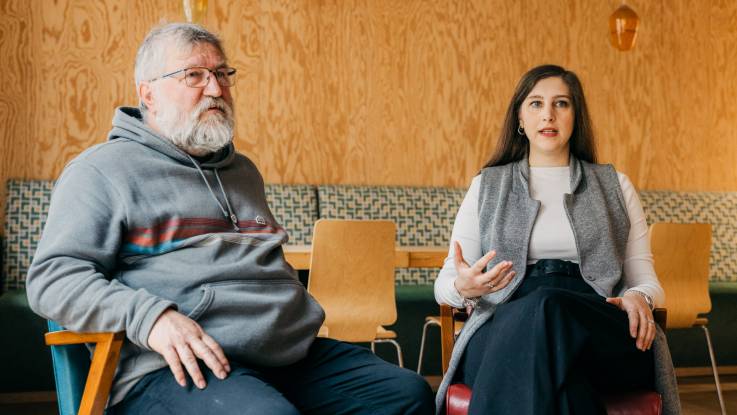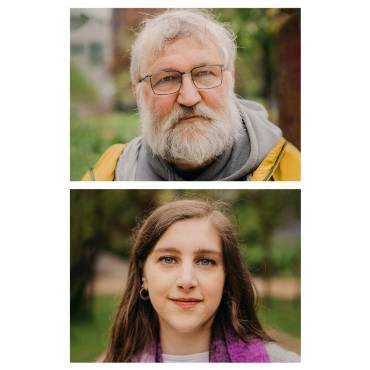«The energy transition can save democracy»
Sebastian Drescher in conversation with Stavroula Pappa and Dirk Vansintjan
As the Brussels representative of European citizen-led energy initiatives, REScoop.eu aims to ensure EU citizens can play a central role in the energy transition.
Dirk Vansintjan and Stavroula Pappa have just a few minutes’ walk from their office to the headquarters of the European Commission – a route they know like the back of their hand. Last year, they and their colleagues organised a total of 188 meetings with members of the European Parliament and experts from the Commission, as well as with representatives of the European Union’s Member States and regulatory authorities. All those discussions were in pursuit of the same goal: to drive forward the democratic energy transition.
Vansintjan has a wealth of experience to draw on: the 64-year-old Belgian is one of Europe’s renewable energy pioneers. Back in 1991, he and some likeminded people set up the energy cooperative Ecopower, which now supplies around 60,000 households with electricity. In 2013, Vansintjan co-founded REScoop.eu, the European federation of citizen energy cooperatives, of which he is still president today. A staunch advocate of the cooperative concept, he is now primarily concerned with the question of how a collectively organised energy supply system can also instigate far-reaching social change.
Pappa, a 31-year-old Greek lawyer, knows that many obstacles need to be overcome before that can happen – particularly in southern and eastern Europe. She has been working with REScoop.eu for four years now, advising politicians and authorities on how to formulate laws and regulations. She is also a volunteer with the Greek energy community Hyperion, which connected its first solar plant to the grid this spring. A few weeks before the elections for the new European Parliament, Energiewende-Magazin set up a video call with Vansintjan and Pappa.
Ms Pappa, how did it feel when your Hyperion initiative was connected to the grid for the first time?
Pappa: I was in a conference on citizen energy when I received the news that, after four years of arduous work, we were finally producing our own energy. It was a big moment, and I was really excited. I did not expect it to trigger such strong feelings.
Vansintjan: I have heard from many of my younger colleagues that it was the prospect of generating their own energy that motivated them to join an energy community.
Pappa: Yes, but also because we really believe in the concept.
Why do you use the term “energy communities”, not “energy cooperatives”?
Vansintjan: Many of our members are not technically cooperatives, even if they work according to cooperative principles; they are foundations or NGOs. When the European Commission asked us how more citizens could be encouraged to get involved in the energy transition, we said that we wanted to avoid the word “cooperative”. That is how the term “energy community” came about.
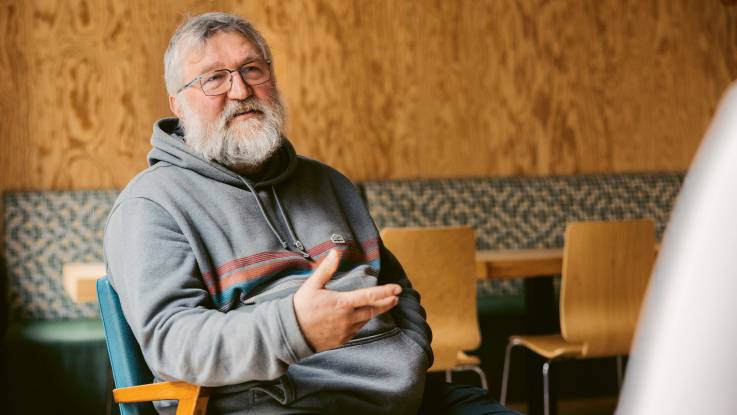
What potential do you see for citizen energy in Europe?
Pappa: I see huge potential. According to a study by Dutch consultancy organisation CE Delft, by 2050 at least half of all EU citizens could be producing their own green electricity – which would meet around 45 percent of electricity needs in the EU. This will require individuals to install solar panels on their roofs, but it will also require participation within energy communities that invest in larger projects.
What can energy communities do better than large, private energy companies?
Vansintjan: You only have to look at what happened during the recent energy crisis – which was primarily an energy price crisis. On average, my cooperative Ecopower produced more electricity than our members consumed. We only had to buy in electricity when there was no wind or sun. But as the purchased electricity became increasingly expensive, we were forced to raise our prices. Then at some point it got so expensive that we decided to have only half of our electricity price follow the market price; the other half we would set ourselves by no longer linking our electricity price to the expensive natural gas price. That meant we were able to reduce prices, and, at the peak of the crisis, we could supply cheaper electricity than all commercial suppliers in Belgium. In other words, to a certain extent we were able to shield our members from the market. The lesson we learned from the crisis is that anyone who is supplying electricity should also be producing it themselves.
Have energy communities also raked in a profit during the crisis, like many of the large electricity companies?
Vansintjan: Most of the energy communities that only produce did make a lot of money. But they have reinvested the profits. One cooperative in Denmark, for example, wants to refurbish its offshore wind farm over the next few years, while others have started building heating networks.
Is it true that the larger the energy community, the more effective it is?
Vansintjan: The idea is for energy communities to grow. It does not make sense at a local level to have 1,000 communities with five people in each. The bigger the initiatives get, the more professional they become – because they can have employees and do not need to be run only by volunteers. And larger communities can realise larger projects. First and foremost, however, all citizens need to have access to such communities. The 2019 “Clean energy for all Europeans package”, or CEP for short, was an important step in that regard.
How so?
Pappa: Because it means that every EU citizen now has the right to set up an energy community, produce energy, and participate in market activities. And because it obliges the Member States to introduce the corresponding regulations and legislation.
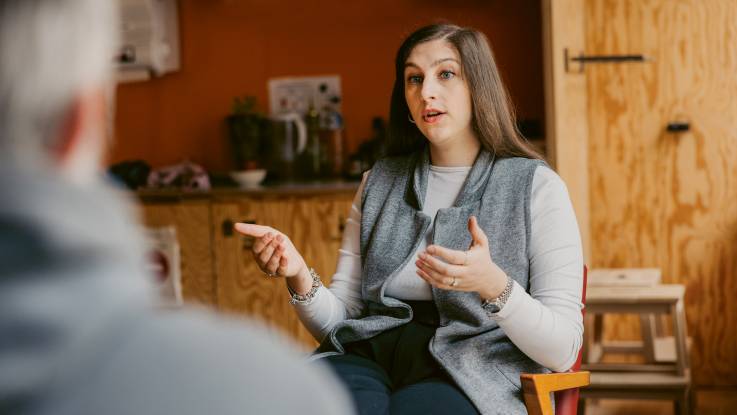
How is the CEP being implemented? The provisions on “energy sharing”, for example – i.e. sharing energy within a community via the electricity grid – are not yet in place in Germany.
Pappa: It is true that countries like Spain, France and Greece are already further ahead on that. Germany has transposed some of the CEP requirements into law. Generally, the Commission will wait until a deadline has passed and then check whether the Member States have done their job properly. If the Commission comes to the conclusion that this is not the case, it can initiate infringement procedures.
Vansintjan: Politicians in the Member States often blame Brussels for something that they themselves are partly responsible for because they were actually involved in the legislative process. But it is easier to tell the voters that everything they don’t like is coming from Brussels.
Your work has given you good insight into the inner workings of the EU. Are there any other clichés or stereotypes that you do not think are true?
Pappa: It is not really a stereotype, but I get the impression that many people often don’t realise how much they are affected at the national level by EU legislation. When problems arise, they approach their national ministries, but many changes are actually due to revised EU directives and regulations. That’s why it’s important that REScoop.eu works to influence EU legislation. When the laws coming out of Brussels are good, it’s easier for beneficial regulations to be developed in the Member States.
What do you expect from the EU following the election of the new Parliament with regard to climate protection and the energy transition?
Pappa: We hope that climate policy and a decentralised democratic energy transition will continue to be a priority – that all the regulations set out in the Green Deal and the Fit for 55 climate package will actually be implemented. But the prognosis is that the Parliament and the Commission will rather become more conservative and that the far right will gain more seats. That could also lead to a shift towards industrialisation and the free market, with citizens’ interests taking a back seat.
REScoop.eu is the European federation of energy communities and a long-standing advocate of the cooperative concept. Founded in 2013, REScoop.eu represents the interests of its members in EU policy-making, offers advice to new and established energy communities, and collaborates with various partner organisations on sustainable solutions for a democratic energy transition. The association is based in Brussels and has 14 employees.
Are right-wing populist or extreme right-wing actors hijacking the concept of energy communities for their own purposes? Such strategies are employed by the right in the areas of environmental protection and nature conservation.
Pappa: I am not aware of any specific examples of that. What is an issue, however, is what we call “corporate capture”, which is when companies exploit a concept – in this case energy communities – for their own gain. So we see private actors taking advantage of the financial incentives and/or priority grid access even though they are not actually citizen-led energy communities and do not abide by the same democratic principles. In Greece, for example, there is an electricity supplier that claims it set up the country’s first energy community. In fact, it is purely a service company for customers who produce their own electricity. Similar scenarios are occurring in other countries like Portugal and Hungary. This is a big problem because it causes people to lose confidence in the concept.
How can that be prevented?
Pappa: Primarily through stricter legal definitions at national level as to what constitutes an energy community, for example, or the percentage of natural persons that need to be involved. It’s possible that the relevant EU legislation also needs to be adapted. It should be made clear that energy communities were created to provide citizens with the same market access that companies have had for a long time. We and our members are currently discussing ways in which we can raise this issue in the EU.
You are in dialogue with many players in the electricity market. Does the traditional opposition between citizens’ initiatives and large corporations still exist?
Vansintjan: Yes, it still exists to some extent. With the introduction of the CEP, for the first time citizens are not only being seen as consumers but also as actors in the energy transition. Energy companies perceive that as a threat and like to portray those citizens as pirates, buccaneers or rich people who are claiming special rights and who want to go off the grid simply because they can. That is why it’s important to show that everyone can participate in the energy transition and to demonstrate that we are also doing something about energy poverty.
Do you have concrete examples?
Vansintjan: The average contribution by members of our Ecopower cooperative is €1,000 – but 75 percent of members only paid in €250. And if someone is not able to put €250 on the table in one go, they can also pay in monthly instalments that are simply added to their electricity bill. That way, people with lower incomes can also participate.
And what are the communities doing about energy poverty specifically?
Pappa: In France, for example, several energy communities have set up a joint fund to support people affected by energy poverty. Our Athens-based energy community Hyperion, meanwhile, offers part of its kilowatt output to energy-poor households free of charge. This is also allowed by the Greek legislation. However, energy communities are not a silver bullet for energy poverty! It is a structural problem that needs to be addressed by the EU and the governments of the Member States – but certainly not by subsidising gas or oil heating systems for energy-poor households.
So far, energy cooperatives and communities have been most active in western Europe. How does REScoop.eu hope to strengthen the concept in eastern and southern Europe?
Vansintjan: We organise an annual European Energy Communities Forum in those regions. This year it was held in Prague; in 2023 we were in Athens. The forum brings together lots of people who are already in an energy community or are thinking of starting an initiative – and who hopefully get a motivational boost from the event.
Pappa: We are committed to supporting initiatives in those regions by sharing our experience and advice. Strengthening the movement in countries that are still lagging a bit behind is one of our priorities.
What is it that tends to be lacking in those countries?
Pappa: Often, it’s the legislation. Some countries have simply copied and pasted EU law without adapting it to their legal framework. It is also a new concept, so there is a lack of trust.
Vansintjan: Another issue is that some of those countries have a Communist past, which makes many people wary of concepts that sound like collectivism. The pendulum is still swinging in the direction of individualism so it needs to swing back a little before a good balance can be achieved.
Does REScoop.eu also offer financial support to new initiatives?
Vansintjan: We founded a European cooperative society, REScoop MECISE sce, which will provide funding for individual energy community projects. The real goal is to set up a revolving fund that, once loan instalments and interest have been repaid, can provide ongoing start-up capital. As soon as the first wind turbines or solar panels are installed, it is easier for communities to attract members.
Pappa: Of course, funding can also be obtained from EU projects. We advise initiatives on how they can access such funding and what requirements they have to fulfil.
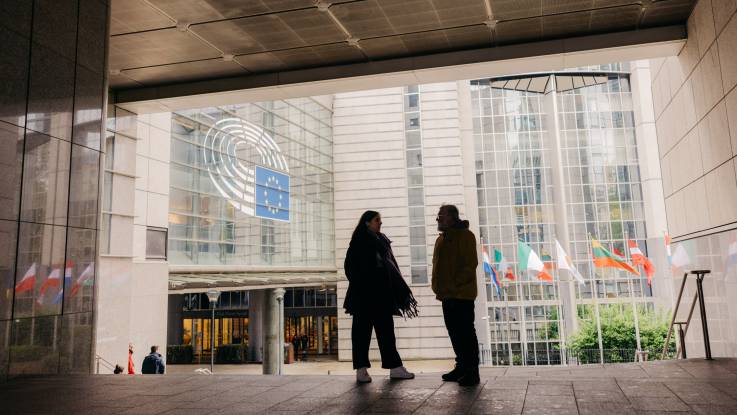
Mr Vansintjan, this spring REScoop.eu wrote a “Cooperative charter” in cooperation with the European Community of Consumer Cooperatives (Euro Coop). In it, you outline a shift towards a more cooperative society and call on consumer and residential building cooperatives to become more actively involved in the energy transition. What was the motivation behind the publication?
Vansintjan: We are calling for this fundamental change because it is clear that we are facing a polycrisis. By now, everyone should have realised that capitalism, neoliberalism and even state communism lead to the same results: climate crisis and injustice. We must finally bring our economy and our society within the boundaries of what our ecosystems are able to provide without suffering damage. It is time for a cooperative economy and a cooperative society. We need cooperation instead of competition.
If we approach the energy transition in the wrong way, we will see developments like those in France with the gilets jaunes or “yellow jacket” protests. And if the infrastructure in rural areas continues to collapse, the people living there will revolt. So far, a lot of money for energy has been flowing out of our local economy and going to regimes in places like Russia and Azerbaijan, which we definitely do not want to support. We have to make sure that the energy is produced by local people and that they also benefit from it financially. They can then invest the money in the things they need. In the UK, for example, there is a foundation that helps citizens take over local pubs or shops and set up a cooperative. Initiatives such as those bring – and keep – people together. An energy transition that brings about energy democracy can help save our democracy as a whole.
What is the best way to communicate that?
Vansintjan: By starting at the municipal level. If you show mayors how much money from their citizens’ pockets and from the local economy is being spent on energy and that there is a way to keep half of that money circulating locally, that should convince everyone – regardless of where they stand politically. That is why sometimes, instead of talking about the climate crisis, we need to talk about the local economy: about breathing new life into rural areas, about finding a balance between the rural and the urban, between today’s generation and the generations to come, between the North and the South. Local people must benefit – and energy plays a crucial role in that.
Pappa: We also need to pass on our enthusiasm. Two years ago, my parents knew nothing about energy communities or energy in general. Now they are members of Hyperion and regularly send me articles on community energy that they find online. So energy communities can actually help change attitudes and behaviour. And that is exactly what we need for the energy transition to succeed.
Lead photo: Kevin Faingnaert / Translated from the German by Grace Winter / Babelfisch Translations. You can also read the report in German.
Dirk Vansintjan, (born 1959 in Halle, Belgium) is a linguist, founder of the energy cooperative Ecopower in Flanders and president of the umbrella organisation REScoop.eu. He is a member of the Flemish green party Groen and stood as a lower-ranked candidate in the 2024 European Parliament elections.
Stavroula Pappa, (born 1993 in Athens, Greece) is a lawyer and policy advisor at REScoop.eu. She came to Brussels after completing a postgraduate degree in energy and climate law at the University of Groningen. She is also a member of the Greek energy community Hyperion, which she advises on legal issues.
More on the topic
-
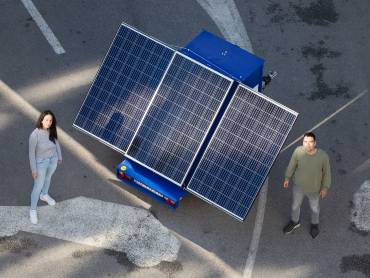
Croatia goes over to the sunny side
Despite its enormous potential, solar energy has yet to get off the ground in Croatia. A green energy cooperative called ZEZ wants to change that.
-
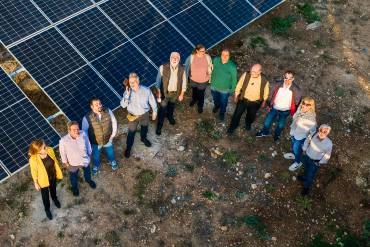
The greek miracle of the sun
A cooperative on the island of Crete is combining community energy with active solidarity.

